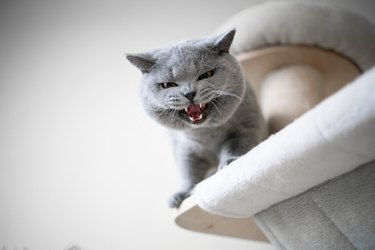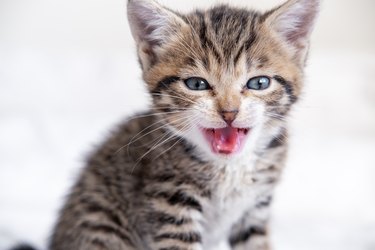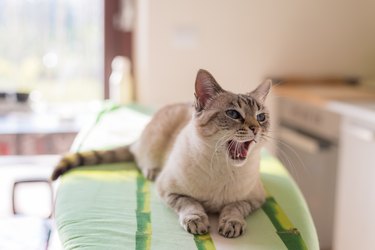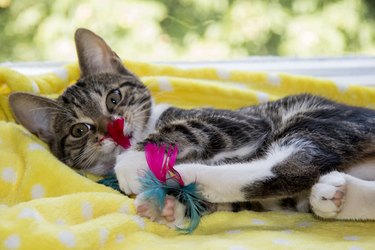If you share your home with a cat, you've probably learned to interpret some of their unique vocalizations — like the insistent meow that informs you it's dinnertime. When it comes to hissing, what is your cat trying to tell you?

Why does my cat hiss?
Hissing is a cat behavior that warns a potential threat not to come any closer. Cats will often hiss when they feel scared, angry, or annoyed, and may also hiss when they are in pain. Hissing is not a sign that a cat simply doesn't like you. A hiss is a reaction to an immediate situation and isn't necessarily an indicator of overall aggressive behavior.
Video of the Day
Video of the Day
What does cat hissing sound like?
A cat's hiss sounds similar to a snake's hiss, or like the air being let out of a tire. The sound of a cat's hiss can vary between individual cats. The sounds can also range in intensity from a silent, open-mouthed hiss to a loud spitting sound.
Why do kittens hiss?
Though a hiss from a kitten may not sound nearly as serious as that from an adult cat, kittens will hiss when scared, angry, or uncertain. Kittens also sometimes hiss when play-fighting with their siblings. As they explore the world, kittens find lots of reasons to hiss at people, unfamiliar objects, and even loud noises. As with an adult cat, respect a hiss for what it is — a warning sign. If a kitten hisses at you, give them some space.

Why do mother cats hiss?
A mother cat who is caring for a litter of kittens will be protective of her babies. She may hiss at humans or other animals who come too close and warn them to stay away. Mother cats will hiss at their kittens to teach them boundaries and acceptable behaviors. They may also hiss at their kittens during weaning to let the kittens know not to try to nurse from her.
Do certain cat breeds hiss more than others?
There is no indication that some cat breeds hiss more than others. If you have two feline friends of different breeds and find that one hisses more than the other, it may simply be due to their individual personalities. Some cats may be more nervous or sensitive, leading them to hiss more often than others.
Cat hissing vs. cat growling
A growling cat may be indicating that they are scared, angry, or annoyed. Similar to a hiss, a cat growl is a warning sign to back away.
Why is my cat randomly hissing or growling at nothing?
With their sensitive hearing, cats can pick up on noises that are undetectable to human ears. Your cat may just be reacting to a noise outside that you can't hear, or perhaps a rival cat darted through the yard without you spotting it.
If you notice your cat is frequently hissing or growling at nothing, it's best for them to see their veterinarian. A cat who is in physical pain may hiss or growl excessively. A checkup can help rule out any physical or behavioral causes.

What should I do if my cat hisses or growls at me?
If your cat hisses or growls at you, they are telling you to give them some space. Cats are particularly sensitive to body language. Even a cat you share a close bond with may hiss at you if they feel uncertain about your movements. If you're not sure why your cat hissed at you, calmly move away. Give your cat some time to themselves.
How to help your cat feel less stress
Some stressors in a cat's life, like a new family member joining the household, are unavoidable. Cats are sensitive creatures and may become stressed by more subtle situations.
If your work schedule has changed, a new pet joined the family, or your routine has otherwise changed, your cat's stress level will likely go up. Watch for signs of stress in your cat: hiding, frequent hissing or growling, refusing food, and urinating or defecating outside of the litter box.
Enrichment items like toys, puzzles, and cat trees provide lots of mental and physical stimulation that can help a stressed-out cat. Some cats may also benefit from a cat pheromone spray or diffuser, which can provide a calming effect.
Cat hissing and growling FAQs
How do you calm a hissing cat?
If your cat hisses, see if you can determine the cause. If possible, remove whatever triggered the hissing from the cat's space. Whether or not you can identify the stressor, avoid the temptation to scoop up and cuddle a hissing cat. Speak softly and quietly to your cat and move away from them slowly. Give them time to settle down.
Should I hiss back at my cat?
If your cat hisses at you, do not hiss back at them. They could interpret your hissing as a threat and they may even become scared of you.
Why does my kitten hiss or growl at an older cat?
If a kitten feels intimidated by an older cat, they may hiss to tell the adult cat to stay away. When introducing new kittens to resident cats, supervise them and pay close attention to each cat's body language.

The bottom line
Common reasons why a cat may hiss or growl include fear, anger, annoyance, or physical pain. Cats hiss and growl to communicate that they need space. Even if you're not sure of the reason for a hiss, respect this feline behavior as a warning sign and give your cat some time to themselves.